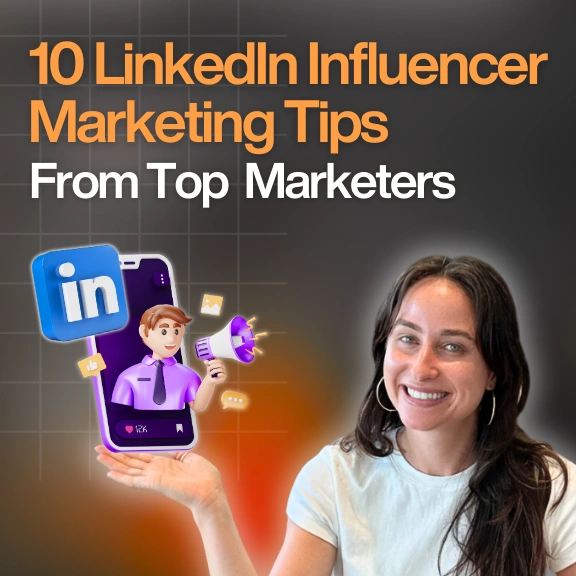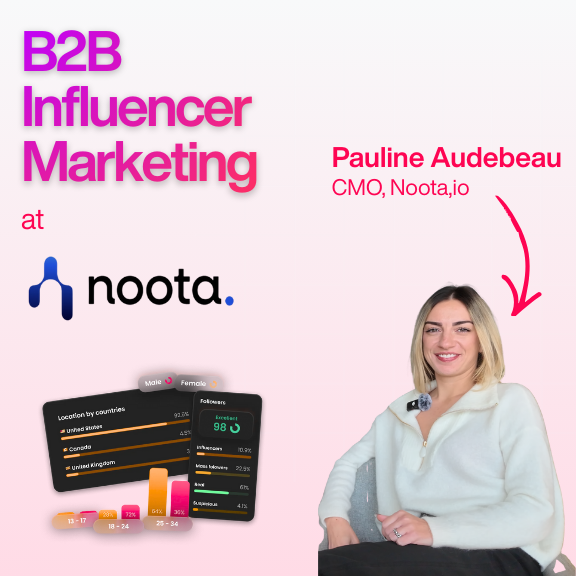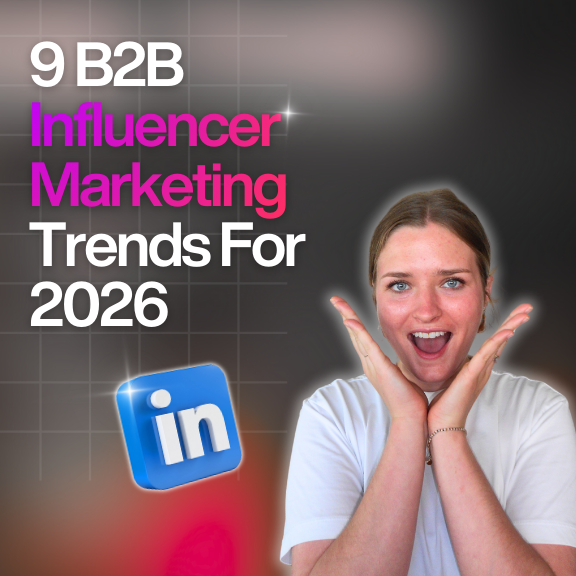Blog & Articles
Your ultimate ressource for the creator economy
Methodology & Rankings
About Favikon, rankings, tools & much more.
Insights
The recipe behind Favikon's viral & coveted rankings.
Free tools to power your influencer marketing workflows.
See Favikon users' success stories.
Get access to all Favikon rankings.
Become a Partner
Become an Affiliate
About the team behind Favikon
The place to talk creator economy, together


Featured Rankings

Here is the Top 50 Rising Video Creators on LinkedIn. Video is quickly becoming the platform’s most powerful format, with creators gaining more reach and engagement than ever. As Gen Z grows its presence and tools like BrandLink and Thought Leader Ads support content creation, LinkedIn is doubling down on video. This ranking, made in partnership with OpusClip, celebrates the creators leading this shift and aims to inspire anyone ready to start sharing through video.

Here is the Top 50 Rising Video Creators on LinkedIn. Video is quickly becoming the platform’s most powerful format, with creators gaining more reach and engagement than ever. As Gen Z grows its presence and tools like BrandLink and Thought Leader Ads support content creation, LinkedIn is doubling down on video. This ranking, made in partnership with OpusClip, celebrates the creators leading this shift and aims to inspire anyone ready to start sharing through video.
Influencer Marketing Trends in 2025
Check out 2025's top influencer marketing trends, including creators becoming consultants, athletes evolving into entrepreneurs, and the rise of B2B products. Learn how these shifts are redefining the creator economy and shaping modern business strategies.



Jérémy Boissinot is the founder of Favikon, an AI-powered platform that helps brands gain clarity on creator insights through rankings. With a mission to highlight quality creators, Jérémy has built a global community of satisfied creators and achieved impressive milestones, including over 10 million estimated impressions, 20,000+ new registrations, and 150,000 real-time rankings across more than 600 niches. He is an alumnus of ESCP Business School and has been associated with prestigious organizations such as the French Ministry and the United Nations in his professional pursuits.
Check Brand DealsInfluencer Marketing Trends in 2025
The role of content creators has evolved significantly in recent years. Once seen primarily as individuals who built communities and shared content, creators are now transforming into entrepreneurs who actively participate in strategic decision-making and lead their own initiatives. In this article, we explore how creators are stepping into new roles as advisors, consultants, and business leaders, and how this shift is shaping the creator economy.
1. Creators Becoming Advisors and Consultants
One of the most significant trends shaping the creator economy is the evolution of creators from content promoters to strategic advisors and consultants for brands. More and more companies are recognizing that creators, who have deep and authentic connections with their audiences, offer valuable insights that go beyond just promotional content. This expertise, grounded in a real understanding of consumer behavior, is being leveraged by brands to drive growth, refine products, and craft more authentic marketing strategies.
Creators as Strategic Advisors: A Growing Trend
Brands are no longer just seeking creators for simple brand mentions or product placements. Instead, they’re increasingly collaborating with creators in more meaningful ways, allowing them to play a role in product development, marketing strategy, and brand identity.
Companies like Paramount have been at the forefront of this shift. Through its brands such as Nickelodeon and Awesomeness, Paramount frequently hires creators as consultants. These collaborations aren’t just about content—they’re about tapping into creators’ unique perspectives to shape the direction of the brand. As RJ Lare, Vice President at Paramount, puts it: “Some of our best hires come from the creator community, and we’ve learned as much from them as they’ve learned from us.”

This collaborative approach has enabled Paramount to stay relevant in the fast-changing entertainment landscape, where creators often set the trends. By learning from the creators’ expertise and their close connections with their audiences, brands can adapt their strategies in real-time and in ways that resonate more deeply with consumers.
The Shift Away From Celebrity Endorsements
In the past, brands often turned to celebrity endorsements as the go-to marketing strategy. But today, brands are looking for more authenticity, and creators offer just that. Unlike traditional celebrities, creators have built highly engaged, niche communities based on trust and relatability. As a result, their endorsements feel more genuine and are often more impactful.
A perfect example of this shift is MKBHD (Marques Brownlee), a tech influencer and content creator, who partnered with Ridge. What’s unique about this collaboration is that MKBHD doesn’t just endorse Ridge’s products—he also plays a strategic role in shaping the brand. His involvement goes beyond the typical “brand ambassador” role, making him an integral part of the company’s growth and product evolution. This is a stark contrast to the traditional celebrity endorsement model, where the celebrity’s involvement usually ends with the campaign.

Co-Creating Products with Influencers
Another example of how creators are taking on strategic roles is Gymshark’s collaboration with fitness influencer Whitney Simmons. Gymshark doesn’t just partner with influencers to promote their products—they work hand-in-hand with them to co-create entire product lines. Whitney’s deep connection with her fitness-focused audience allows her to provide feedback and insights on design, functionality, and what resonates most with consumers. As a result, the products are not only popular but are also tailored to the specific needs and preferences of her community.
Similarly, Adobe has leveraged the expertise of creators like Peter McKinnon, a photographer and filmmaker, to improve their Creative Cloud tools. By working directly with Peter, Adobe gains insights into how creators use their products in real-world settings, allowing them to make targeted improvements that better serve their creative community.
The Global Reach of Creator Consulting
This trend isn’t limited to the U.S.—it’s happening globally. In France, for instance, Shubham Sharma, a prominent voice in the no-code community, serves as a consultant for Qonto, a fintech company. Shubham’s deep understanding of no-code tools and digital ecosystems helps guide the development of Qonto’s digital tools, ensuring that they meet the evolving needs of their users.
Why This Matters
These partnerships show that creators are no longer just influencers—they have become key strategic partners. By contributing to product development and marketing strategy, creators position themselves as thought leaders and vital drivers of growth for businesses.
2. Creators as Entrepreneurs Beyond B2C
Creators are increasingly defining themselves not just by their content but by their entrepreneurial skills and specific industry expertise. The landscape has shifted from simply being “Instagram influencers” to being recognized as experts in fields like beauty, tech, or artificial intelligence.
LinkedIn: The New Platform for Entrepreneurial Creators
LinkedIn has become a key platform for creators who are transitioning from traditional influencer roles to fully-fledged entrepreneurs. While many creators have built their presence on platforms like Instagram or YouTube, LinkedIn offers a unique opportunity to establish credibility as business leaders and grow professional networks. Influencers like Snoop Dogg, Brooke Monk, Logan Paul, and Anitta have expanded their reach by engaging on LinkedIn, not just as entertainers or content creators, but as entrepreneurs who want to solidify their standing in the business world.

B2B Products Launched by Creators
A major trend within the creator economy is the shift from targeting consumers (B2C) to creating products and services aimed at businesses (B2B). Creators are realizing that their expertise in content creation, marketing, and audience engagement can be applied to industries beyond entertainment or lifestyle.
For example, Ruben Hassid is a prime case of a creator who has made a successful leap into the B2B space. Ruben uses LinkedIn to promote his SaaS (Software as a Service) company that helps individuals break into the tech industry. By leveraging his platform on LinkedIn, Ruben has been able to reach a professional audience, positioning his product as a solution for businesses and individuals looking to advance their careers in tech.

This shift toward B2B product creation marks an important evolution for creators, who are no longer limited to relying on brand partnerships and consumer products to generate revenue. Instead, they are building long-term, sustainable businesses that cater to the needs of other businesses. This not only helps diversify their revenue streams but also gives them greater control over the products and services they offer.
This entrepreneurial shift is not without its challenges. Creators now bear the full responsibility for their products. For instance, Marques Brownlee faced backlash when a product he endorsed underperformed (more information in this article). Where brands once took the blame for failed partnerships, creators are now directly accountable, demonstrating their commitment to quality and authenticity.
3. Athletes Evolving into Entrepreneurs
Athletes are not just remaining within the realm of sports but are expanding their influence by becoming content creators and entrepreneurs.
During the Olympic Games, influencers invited by NBC struggled to gain traction, while athletes like Ilona Maher from the U.S. rugby team stole the spotlight, gaining nearly 2 million followers with her authentic content. Here are some key reasons for this shift:
- Authenticity and Relatability: Audiences are increasingly drawn to content that feels genuine and personal. Ilona Maher’s content, which included behind-the-scenes moments, humorous commentary, and unscripted interactions with other athletes, allowed viewers to see the Olympics through her eyes. This type of content felt more authentic and engaging than the polished, brand-focused content often created by influencers.
- Inside Access and Unique Perspective: Athletes have a front-row seat to the action and are part of the Olympic experience itself. They can share exclusive insights, raw emotions, and moments that are not captured by mainstream media. This insider access gives their content a unique value that traditional influencers cannot easily replicate.
- Storytelling Ability: Athletes are natural storytellers. Their narratives around training, competition, and personal journeys resonate with fans looking for inspiration.
- Shift in Audience Preferences: There’s a growing trend toward valuing content from creators who are not just selling a product but sharing their own experiences and stories. Fans appreciate the transparency and vulnerability shown by athletes, who openly discuss their victories, struggles, and personal lives, making them more relatable and trustworthy.
- Engagement and Interaction: Ilona Maher actively interacted with her followers, responding to comments and creating a community-like atmosphere around her content. This level of engagement builds a stronger bond with her audience, which influencers brought in by brands may not always be able to achieve.

On platforms like YouTube, stars such as Cristiano Ronaldo have launched their own channels, while athletes like Kelvin Beachum Jr. started newsletters focused on entrepreneurship. This allows them to build personal brands, diversify income, and engage directly with fans. They maintain strong connections with their audience, supporting business ventures and ensuring financial stability even after their sports careers.

In France, former athletes like Tony Parker and Blaise Matuidi are active on LinkedIn, sharing their experiences as investors and entrepreneurs. Current athletes such as Léon Marchand, Antoine Dupont, and Aurélien Tchouaméni also leverage these platforms to build influence in the business world.
Why This Matters �
The involvement of athletes in the creator economy illustrates that entrepreneurship is no longer exclusive to traditional influencers. By leveraging their public personas, athletes are launching businesses, promoting products, and positioning themselves as leaders in various industries.
Conclusion: A New Era for the Creator Economy
The shift from content creation to entrepreneurship marks a new era for the creator economy. Today’s creators are key players who drive growth, innovation, and strategic decisions in businesses. Social media is now an economic powerhouse, reshaping marketing strategies and impacting how businesses are structured.
Key Takeaways 📌
- Creators are acting as advisors and consultants, providing brands with valuable insights.
- Entrepreneurship among creators has expanded beyond B2C to include B2B ventures.
- Athletes are joining the creator economy, using platforms to expand their influence.
- This evolution is transforming the creator economy into a central force in shaping modern business strategies.
Related Articles
See all the articlesResources











.png)










